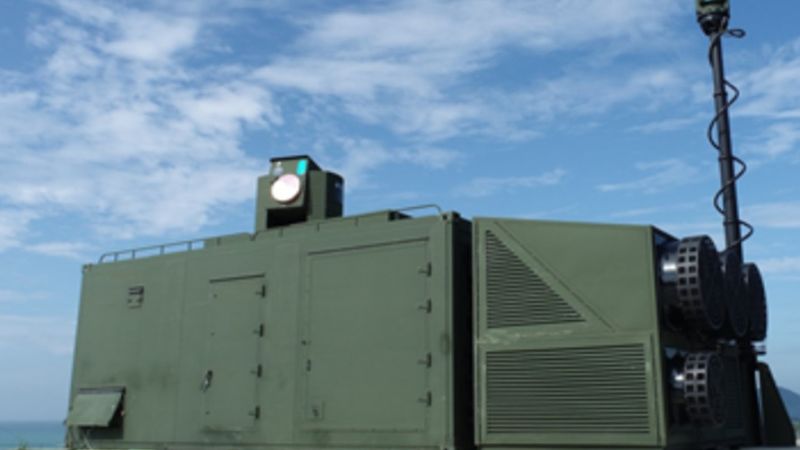South Korea is beginning the mass production of a low-cost laser weapon that has successfully shot down small drones during testing, the country’s key arms agency said Thursday.
The laser weapon, called Block-I, “can precisely strike small unmanned aerial vehicles and multicopters at close range,” a news release from South Korea’s Defense Acquisition Program Administration (DAPA) said.
The release did not give a cost for the weapon, but said each shot fired would only cost about $1.50.
Imagery supplied by the agency appears to show a weapon around the size of a shipping container with a laser mounted on top and what appears to be a radar or tracking device mounted on one side of the platform.



What’s the kW or MW class of laser? If it’s too low, it could be ineffective against even tinfoil wrapped quad copters.
Inb4 flying disco balls!
Might still be powerful enough to blind the optics, which would effectively cripple them. Without a video feed neither FPV drones nor grenade-dropping ones would have the necessary precision to be effective.
Unless they’re gps guided, or they can turn their camera away from the laser source in time.
GPS wouldn’t be effective at all for drones dropping munitions on infantry moving around on the battlefield, nor on FPV drones trying to fly into moving tanks or other vehicles.
And how do you turn a drone away from an infrared beam of light that would damage the drones optics almost instantly? You’d have to spot the laser system from hundreds of yards away, recognize it’s aimed at your drone, and turn away before the laser is fired. And then what? Just avoid turning your drone back the way you want to go, hoping another strategically positioned laser you didn’t see doesnt fire from a different direction?
You’d need to know where the laser system is, yes. You could do that by having a first done get shot at to reveal the position so the others know where not to look.
Gps would still be effective against stationary targets, but gps jamming would probably be very effective.
A buck fifty a shot at the rate I pay is about 12
KwhkwH 😉 of power. That laser has got to be way up there in power.kWh
(I’m sorry, I have nitpicking issues.)
What a coincidence! I have picnicking issues.
I love you
Fixed
Oh you monster.
Yeah I’m no light expert but can’t they just make shilding and filters for this sort of attack vector?
Depends on the wavelength. Standard mirrors don’t always do mirror things at wavelengths far outside the visible spectrum.
Part of the advantages of UAVs is that you can deploy a lot of them cheaply with stuff you buy on eBay. While eBay does sell some of the more exotic mirrors for CO2 laser cutters (which are far-IR wavelengths), you couldn’t buy a lot of them to cover a single drone. It’d cut into the cost advantage, and would also weigh it down a lot.
My initial reaction was that it’s going to make drones more cost prohibited. Logistics of only deploying unshielded drones where there aren’t lasers will probably be a thing now too.
Even if they can, it will decrease the payload somewhat, and as the lasers get better the shielding will have to get stronger.
It’ll forever be a back and forth thing
Wouldn’t that cut it’s communication though?
I don’t think so? Radios don’t care is a laser is shining at them.
The tinfoil, not the laser
You could just stick the antenna through the foil. Antennas are just pieces of wire, which can also be made from shiny metal.
Oh okay, yeah you’d probably leave the top un-foiled for the radio
The tinfoil would stop it.
My coworker and I literally tried wrapping an access point in aluminum foil to replicate poor connectivity. It didn’t do shit. Even completely lined a cardboard box and put it inside with zero change.
Tinfoil won’t do shit.
https://blog.ibwave.com/a-closer-look-at-attenuation-across-materials-the-2-4ghz-5ghz-bands/
The link provided doesn’t say anything about tinfoil or aluminum foil…